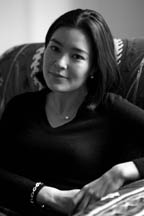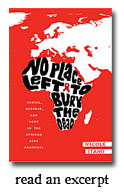 |
|
|
Excerpt Chapter 1: Maleshoane On a warm October day in 2003, a young woman named Adeline Majoro made her way across Maseru, the capital city of a small mountain kingdom at the tip of Africa called Lesotho. A hint of spring was in the air, but the land lay parched after several years of drought. Most of the city was brown: dusty dirt roads, mud-colored mountains, gray-brown concrete buildings. As she usually did, Adeline walked a few blocks down a rutted lane from the single room where she lived alone, to a main road. There she waited for one of the run-down, sagging Toyota vans, called taxis, that serve as the main form of transportation in the city. On most days Adeline caught a taxi to the city center, where she taught business and accounting to high school students not much younger than herself. That October day, however, Adeline had steeled herself to make a journey she had been avoiding for weeks. She climbed into a taxi and headed to a small mission clinic on the other side of the city for the results of an AIDS test. Then just twenty-two years old, Adeline had a broad face, wide hips, and a big, ever-present smile. She dressed conservatively, avoiding the tight, revealing clothes popular among many of her contemporaries. Her mode of dress reflected a certain seriousness in her character. Adeline knew what she wanted from life and worked hard to get it; she had no time to spend at bars or looking for men. During the day she taught, and at night she took classes on a government scholarship to become a chartered accountant. At home, in the village where she was born, she had a young son who lived with her mother. Like most Basotho -- the collective name used for the people of her country -- Adeline was born in a rural area but had been lured to the city in hope of a better life. In 1966, when Lesotho was granted its independence by Great Britain, its capital of Maseru was a sleepy colonial town of about 15,000 whose grandest buildings were a handful of administrative structures built from yellow sandstone hewn from the local mountains. There was a single hotel and a handful of paved roads. In the four decades since, Maseru has sprawled outward from a small center. Today it is home to around 170,000 people and is the only city of any size in a country that remains largely agrarian. But beyond the loud and bustling city center, which now awkwardly pairs those original buildings with a handful of modern office blocks and run-down shopping centers, Maseru still has a rural feel. In the neighborhoods that ring the center, such as the one where Adeline lived and the one to which she headed for her test results, the houses were scattered over the landscape rather than squeezed in close together in the manner of a classic slum. When Adeline arrived later that warm morning at Maluti clinic, a simple, crowded health center run by the Seventh-day Adventist Church, a nurse recognized her. To the annoyance of those already in the waiting room, many of whom had been there for hours, she was ushered immediately into a private consulting room. "Maybe they were afraid I would run away," she laughed ruefully when she recalled the incident to me many months later. Adeline had started several years earlier on the journey that had brought her to that small clinic. Over the previous few years there had been small signs that all was not well, each on its own easy to dismiss. First she suffered from strange sores under her arms, then a series of painful abdominal cramps. She sought the services of a traditional healer for a burning outbreak of herpes and, finally, was plagued by itchy and puffy eyes that she initially attributed to an allergy. In the beginning, Adeline tried to convince herself that it was nothing but stress, that her body was simply worn down from the heavy burden of work and school and motherhood. She rose at dawn most days and often went to bed after midnight, studying by the light of a bare bulb in her single room. She had never been sickly, though, and repeated bouts of bad health worried her. She began to fear that something more serious lay beneath her health problems. The allergy-like symptoms finally drove Adeline to confront her fear. In the weeks before she went for an HIV test, she was sent repeatedly back to the clinic, where she was prescribed various syrups and pills. But nothing seemed to help. "I would wake up and my eyes were sore and puffy," she recalled later. "I was going to the doctor every week, but nothing he gave me helped." During the two years that her health had spiraled downward, no doctor ever suggested to Adeline that she get an AIDS test, although some of her symptoms, particularly the "herps," as she called it, are common opportunistic infections associated with HIV infection. Once she even asked a physician if she should get tested. She was breast-feeding when sores appeared under her arms and so asked the doctor she went to see, a private practitioner in the platinum-mining city of Rustenburg in the neighboring Republic of South Africa (where she had been then living), if she should have an HIV test done. He said no. She asked if she should stop breast-feeding and again he said no. She stopped anyway, on the advice of her mother. That was in 2001 and AIDS was running rampant across Southern Africa. Less than a year earlier, Nelson Mandela had called the epidemic "one of the greatest threats humankind has faced" at a huge international AIDS conference held in Durban, South Africa. Yet Adeline's doctor discouraged her from taking steps to learn her status. Perhaps he felt helpless in the face of this incurable, deadly disease. Believing that there was no treatment he could offer his patients if they did test positive, he may have thought it better that they not know. In this he would not have been alone. Many doctors, aid workers, and government officials across the continent felt the same way; throughout the epidemic, Africans in even the hardest-hit communities were often discouraged from learning their status. That would later prove to be one of the biggest mistakes made in combating AIDS in Africa. It was in Adeline's nature, however, to confront the truth. Listening to the radio in South Africa one day she had heard that abdominal cramps could be associated with HIV. The increasing number of posters and signs around Maseru urging people to use condoms and not discriminate against HIV-positive people were also hard to ignore. By 2001, the seed of doubt was planted. Two years later, it had grown into a gnawing fear. It was the end of September 2003 when Adeline finally made her way to the Seventh-day Adventist clinic which was then one of the few places in the country where HIV tests were performed. On that first visit, a nurse had explained the difference between HIV and AIDS, and told her that even if she were infected with the virus, she might not have AIDS yet. She described how the test worked and asked Adeline if she was sure she wanted to take it. The nurse drew some blood and told her to return in a few days. Tests that gave results in minutes were already being used in wealthier parts of the world, but such new technology had yet to reach that small mission clinic. To determine if she was infected, Adeline's blood had to be sent to a laboratory in another part of the city, and she would have to return. Many patients who found the courage to come for the test never came back for their results; Adeline nearly became one of them. For weeks she delayed her return. "I was scared to go back. Every day I told myself I should go for the results, but I was so afraid." Three weeks later, when she finally found the courage to come for the results, she found herself sitting in a plastic chair in the clinic's bare consulting room, bracing herself to hear news that deep down she thought she already knew. "You have the maleshoane," the nurse told her gently. The two women were alone in a consulting room of a mission clinic, but even there the nurse spoke in metaphors, referring to her patient's sickness by the name of an insect pest. Perhaps the nurse thought it would help soften the blow if the evil remained unspoken. Or perhaps, even at that small mission clinic in a tiny nation at the heart of the epidemic, the sickness in the young woman's blood remained too taboo to be named. For Adeline, though, the meaning was clear enough. In her blood flowed the deadly human immunodeficiency virus, or HIV, the virus that causes AIDS. Despite the nurse's gentleness, the words were a sentence of death. For even in those days, in the third year of the new millennium, there was little hope in Lesotho, one of the world's smallest and poorest nations, for those who tested HIV-positive. She would, she thought, fail her parents, who had sacrificed so much to give her a better life. Her son, just two years old, would grow up an orphan. And she would die. Adeline thinks she cried, although she cannot recall precisely. The nurse tried to give her hope. She told Adeline she knew people who had been tested years earlier and were still healthy. If she ate well, got plenty of rest, and avoided stress, she too could still have years of life ahead of her. Then she referred Adeline to an associated hospital, more than an hour's drive away, that was also run by the Seventh-day Adventist Church and had the country's only AIDS program. If she had enough money, perhaps they could give her some treatment. Her own small clinic had nothing more to offer. As she emerged from the consulting room, almost an hour after she had entered, Adeline heard the grumbles of a group of women outside. "Look at her," she heard one complain. "We came here early and she came late but took the whole day." Adeline walked out without a word and made her way into the hot, dusty streets of Maseru. |
site design by Wicked Sovereign |


